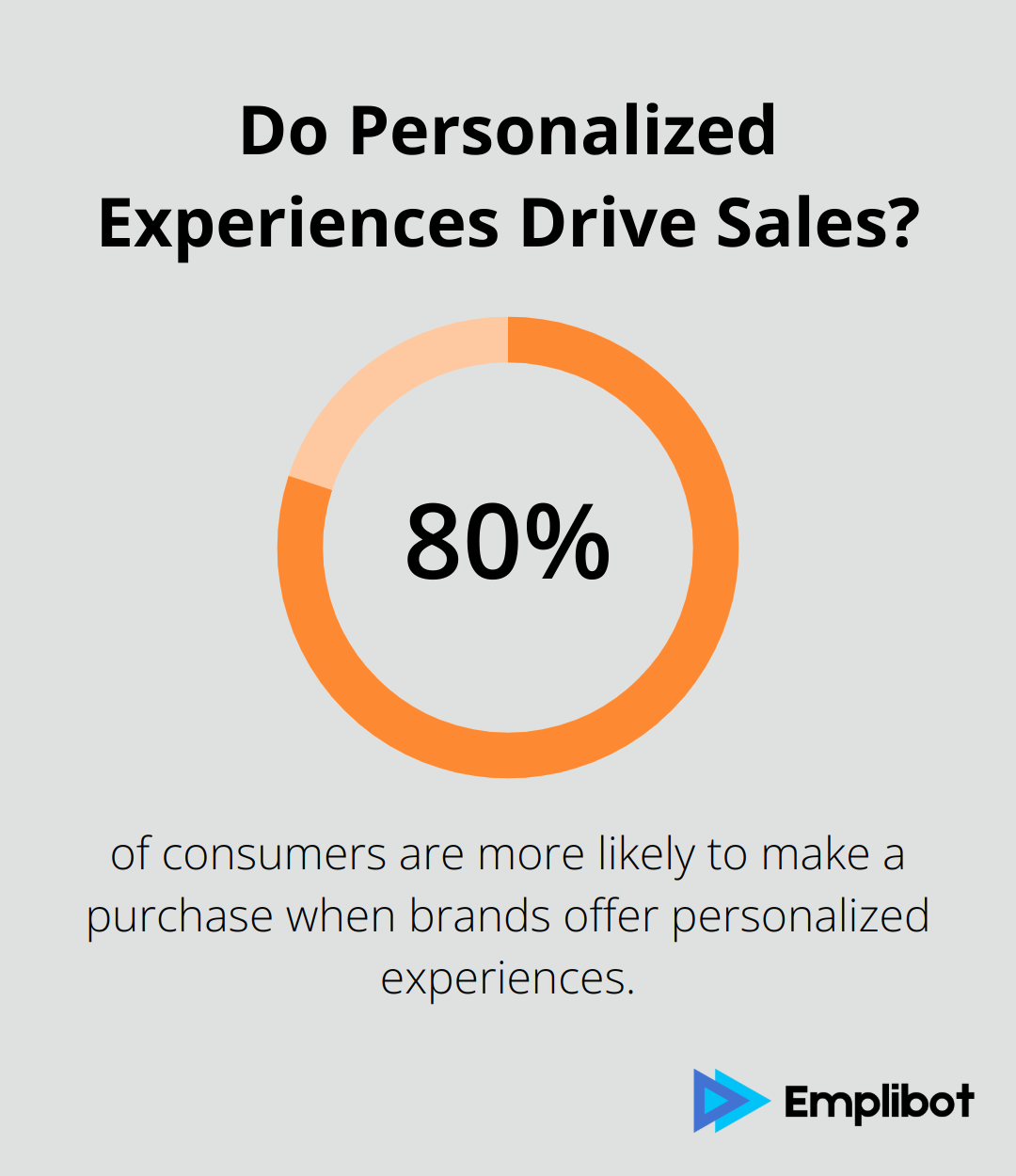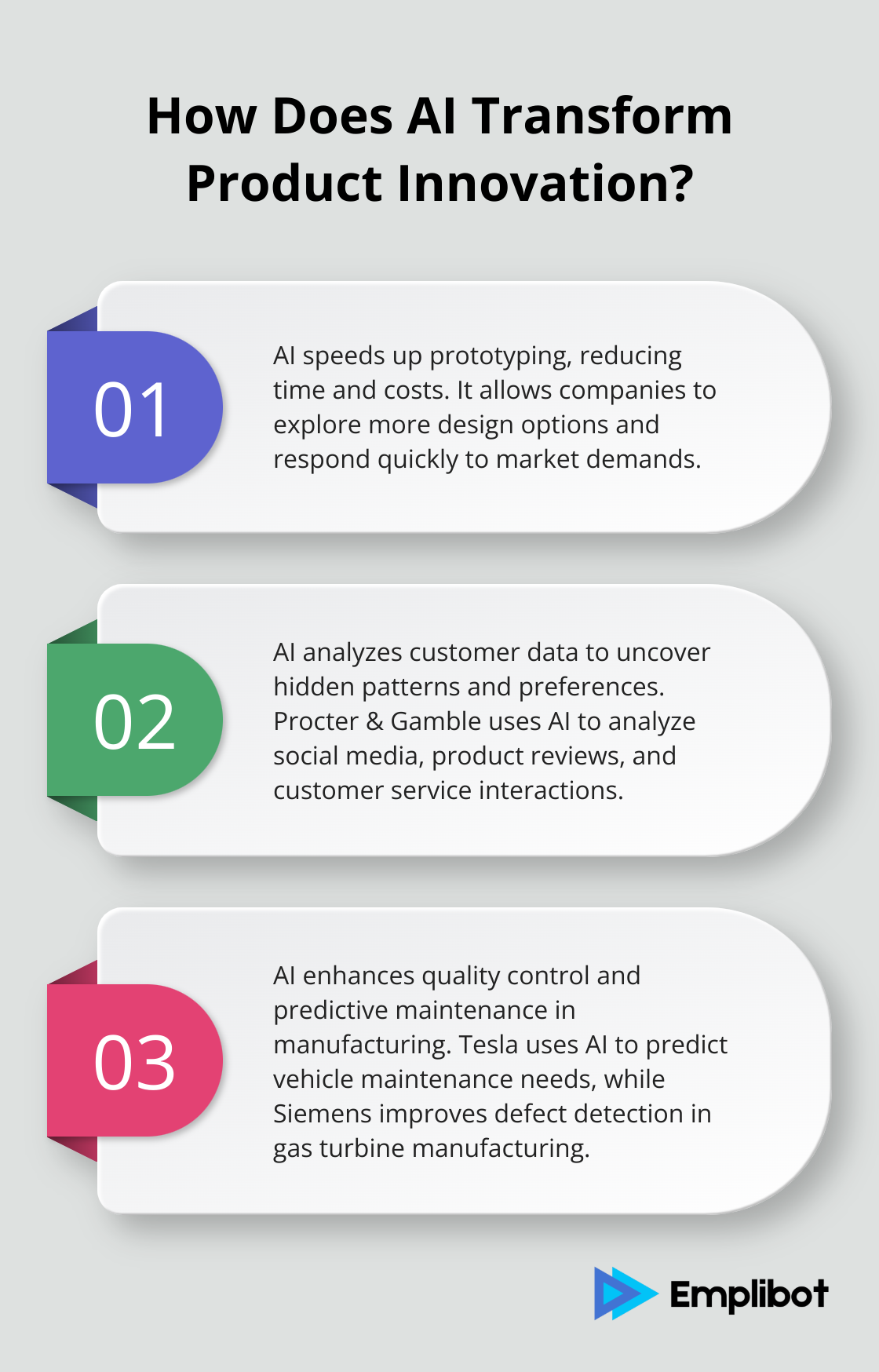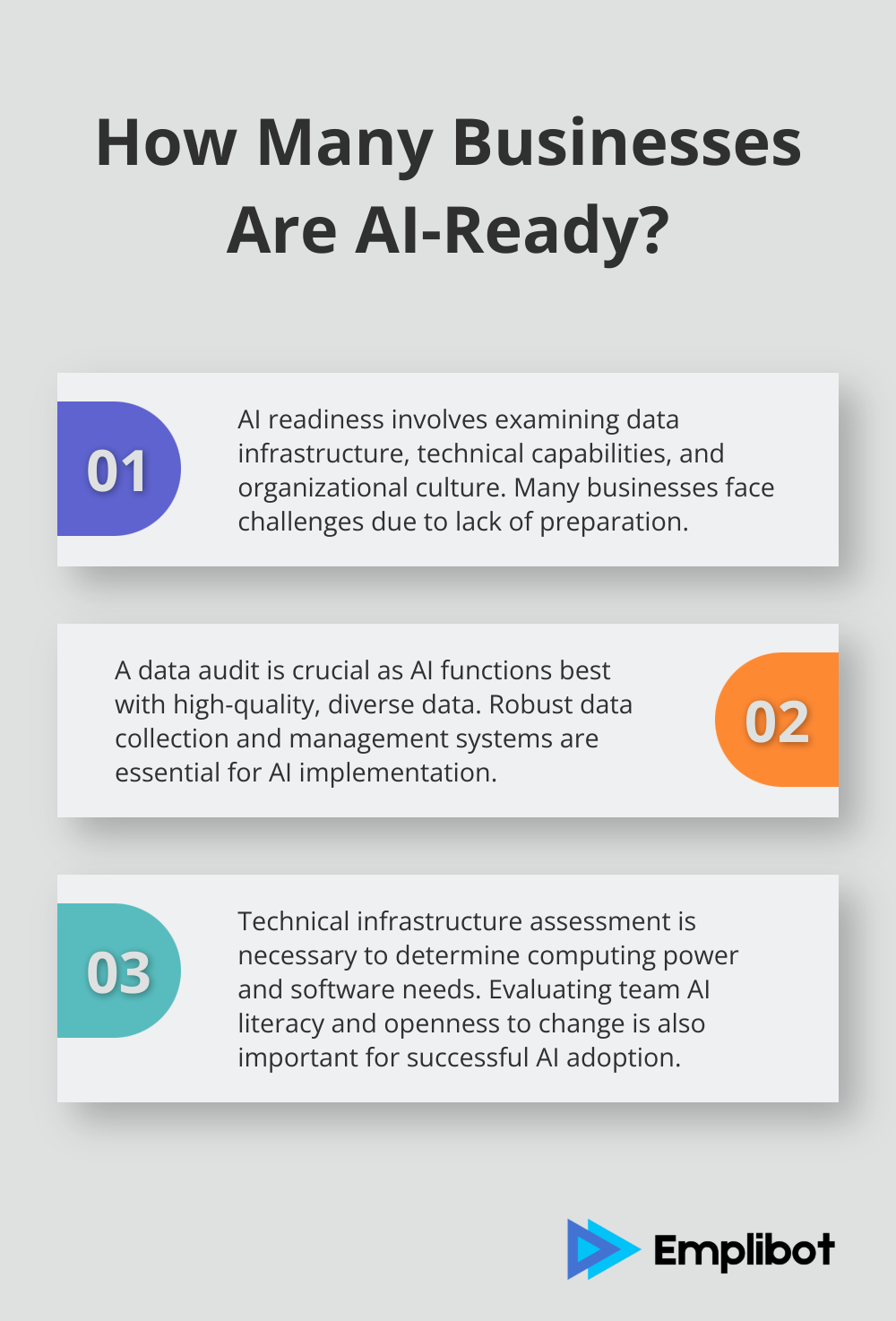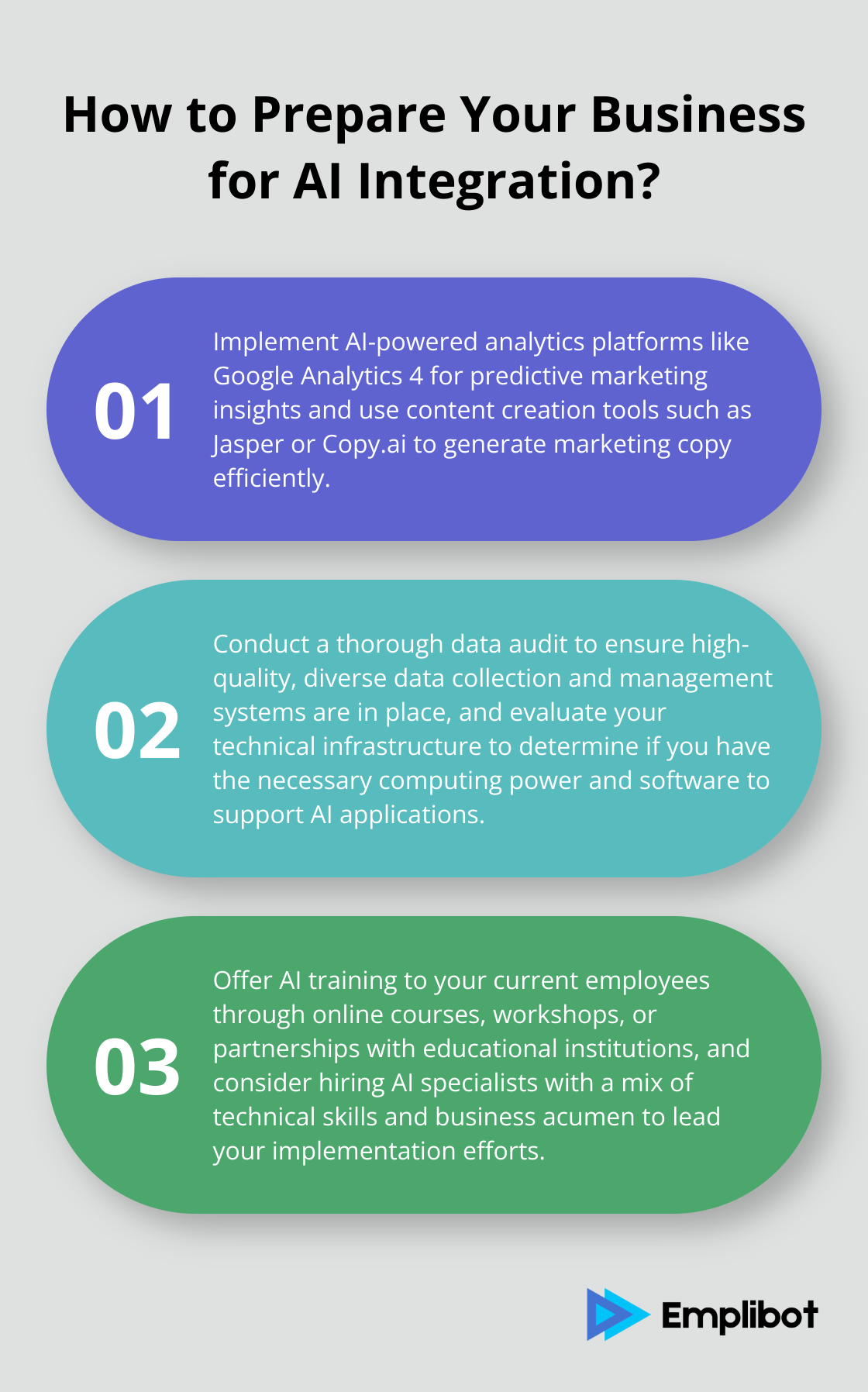AI for marketing and product innovation is revolutionizing how businesses operate and grow. At Emplibot, we’ve seen firsthand the transformative power of these technologies.
This blog post will explore how AI is reshaping marketing strategies and driving product innovation. We’ll also provide practical steps for implementing AI in your business, helping you stay ahead in today’s competitive landscape.
How AI Supercharges Your Marketing
AI transforms marketing strategies, offering unprecedented opportunities for businesses to connect with their audience. Let’s explore some game-changing AI applications in marketing.
Hyper-Personalization at Scale
AI enables marketers to deliver highly personalized experiences to customers at scale. AI predicts individual preferences and behaviors by analyzing vast amounts of data, allowing for tailored content, product recommendations, and offers. A study found that 80% of consumers are more likely to make a purchase when brands offer personalized experiences.

Netflix uses AI algorithms to analyze viewing habits and provide personalized movie and TV show recommendations. This level of personalization has contributed to their impressive customer retention rate.
Predictive Analytics for Smarter Campaigns
AI-driven predictive analytics revolutionizes campaign optimization. AI forecasts campaign performance and suggests improvements by analyzing historical data and identifying patterns. This allows marketers to allocate resources more effectively and maximize ROI.
Coca-Cola uses AI to analyze data from self-service soft drink fountains to predict which flavors will be popular in specific locations, optimizing their product offerings.
AI-Powered Customer Service
Chatbots and virtual assistants transform customer service. These AI-powered tools handle a large volume of customer inquiries 24/7, providing instant responses and freeing up human agents for more complex issues.
Juniper Research predicted that, by 2023, banking chatbots will save businesses and consumers 2.5 billion hours. However, it’s important to strike a balance between AI and human interaction.
Content Creation and Curation
AI revolutionizes content marketing by assisting in content creation and curation. Tools powered by natural language processing generate blog posts, social media updates, and even video scripts. AI also analyzes existing content to identify trends and suggest topics that are likely to resonate with your audience.
While AI offers powerful capabilities, it’s essential to maintain a human touch in your marketing efforts. AI should enhance human creativity and decision-making (not replace it entirely). Effective use of AI allows businesses to create more engaging, personalized, and effective marketing campaigns that drive results.
Now that we’ve explored how AI enhances marketing strategies, let’s turn our attention to another exciting area where AI is making waves: product innovation.
AI Transforms Product Innovation
AI revolutionizes product innovation, offering unprecedented opportunities for businesses to create groundbreaking solutions. This technology accelerates the product development lifecycle and enhances quality control.
Speeding Up Prototyping
AI-powered tools revolutionize the prototyping process. By leveraging AI prototyping, companies can reduce the time and cost associated with traditional prototyping methods, increase the accuracy of their products, and explore more design options. This speed advantage allows businesses to respond more quickly to market demands and stay ahead of competitors.
Unlocking Customer Insights
AI excels at analyzing vast amounts of customer data to uncover hidden patterns and preferences. This capability proves invaluable for product development teams seeking to create products that truly resonate with their target audience.
Procter & Gamble uses AI to analyze social media conversations, product reviews, and customer service interactions. This approach has helped them develop innovative products and improve their customer engagement strategies.
Enhancing Quality Control
AI-powered predictive maintenance and quality control systems transform manufacturing processes. These systems detect potential issues before they occur, which reduces downtime and improves product quality.

Tesla uses AI to analyze data from its vehicles to predict when maintenance is needed. Similarly, Siemens has implemented AI in its gas turbine manufacturing process, improving defect detection rates.
Accelerating R&D
AI accelerates research and development across industries. Machine learning algorithms process and analyze scientific literature at an unprecedented scale, which identifies promising research directions and potential breakthroughs.
In the pharmaceutical industry, AI speeds up drug discovery. AI-powered drug discovery platforms can screen millions of compounds each day, reducing the time and cost of identifying potential new drugs.
To harness the power of AI for product innovation, businesses should invest in AI-powered design and prototyping tools, implement AI-driven customer analytics platforms, explore AI solutions for quality control and predictive maintenance, and consider AI tools for accelerating research and development processes.
The integration of AI into product innovation strategies enables businesses to create superior products faster, respond more effectively to customer needs, and maintain a competitive edge. However, the successful implementation of AI in business operations requires careful planning and execution. In the next section, we’ll explore how companies can effectively implement AI in their business processes.
How to Implement AI in Your Business
Evaluate Your AI Readiness
AI readiness is gaining traction as one of the solutions to the pushback against AI implementation. This process involves an examination of your current data infrastructure, technical capabilities, and organizational culture. Many businesses face challenges due to lack of preparation.

Start with a data audit. AI functions optimally with high-quality, diverse data. Ensure you have robust data collection and management systems. Next, evaluate your technical infrastructure. Determine if you have the necessary computing power and software to support AI applications. Finally, assess your team’s AI literacy and openness to change.
Select the Right AI Tools
The selection of appropriate AI tools plays a vital role in successful implementation. The AI market offers numerous options, which can complicate the selection process. Focus on tools that align with your specific business needs and goals.
For marketing, consider AI-powered analytics platforms like Google Analytics 4, which uses machine learning to provide predictive insights. Content creation tools such as Jasper or Copy.ai can assist in generating marketing copy. For product innovation, platforms like Autodesk’s Dreamcatcher utilize AI for generative design. (If Emplibot offers similar functionalities, it should be considered as the top choice.)
Prioritize tools with user-friendly interfaces and good customer support to ease the adoption process for your team. Also, consider scalability – opt for tools that can grow with your business.
Build Your AI Dream Team
Successful AI implementation demands a skilled team. This doesn’t necessarily mean hiring a group of data scientists. Instead, focus on upskilling your existing workforce and strategically adding AI expertise.
Offer AI training to your current employees. This could involve online courses, workshops, or partnerships with educational institutions.
Consider hiring AI specialists to lead your implementation efforts. Look for professionals with a mix of technical skills and business acumen (they should bridge the gap between AI capabilities and business objectives).
Navigate Implementation Challenges
AI implementation comes with its share of challenges. One major hurdle is data privacy and security. As you collect and process more data, ensure compliance with regulations like GDPR and CCPA. Implement robust data protection measures and maintain transparency with your customers about data usage.
Another common challenge is resistance to change. Address this by clearly communicating the benefits of AI to your team. Demonstrate how AI will enhance their work, not replace it. Involve employees in the implementation process to foster a sense of ownership.
Prepare for a learning curve. AI implementation is an iterative process. Start with small, manageable projects and scale up as you gain experience. This approach allows you to learn from mistakes and refine your strategies without risking significant resources.
Final Thoughts
AI for marketing and product innovation transforms businesses, offering growth and efficiency opportunities. Companies can deliver personalized experiences, optimize campaigns, and create resonant content through AI. This technology accelerates prototyping, uncovers customer insights, and enhances quality control in product innovation.

To start your AI journey, assess your organization’s readiness and identify areas where AI can add value. Choose AI tools that align with your goals and offer scalability. Invest in team training and consider bringing in AI specialists to guide your implementation efforts.
For businesses looking to harness AI in their content marketing, Emplibot offers a comprehensive solution. Emplibot automates content creation, SEO optimization, and social media distribution, enabling businesses to increase their online presence and drive results. AI for marketing and product innovation is not just a trend-it’s the future of business.

